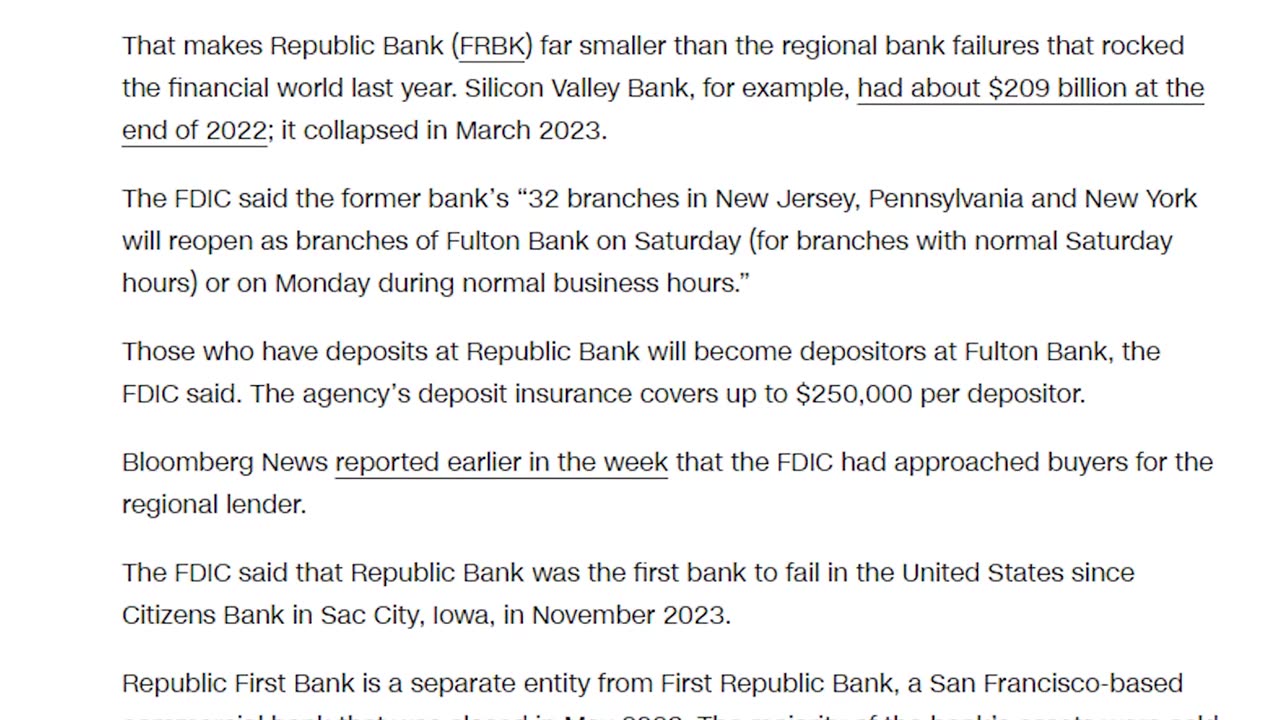Premium Only Content

240514 Its Starting- Physical Cash Withdrawls and Checks BANNED in LESS Than a Week.mp4
[IT MEANS, WE LOSE PERSONAL CONTROL OF OUR MONEY. ANY CASH WE HAVE ELSEWHERE WE LOSE IF IT IS NOT IN CONTROL OF A BANK, CREDIT UNION. MAYBE EVEN BY STORES OF ANY KIND. IMAGINE LOSING ALL OF "MONEY VALUE" IN A DRAWER, WALLET, UNDER YOUR MATTRESS AND IT'S USELESS. AND WHAT ABOUT CREDIT CARDS? AND ALL OF IT WILL BE TAXABLE, PLUS SOME AGENCY, GOVERNMENTS, LOCAL, FEDERAL, CAN SHUT IT OFF IF IT WANTS.]
https://www.youtube.com/watch?v=M8ssxi8RoMs
May 14, 2024 ................................ 8:18
It's Starting! Physical Cash Withdrawls and Checks BANNED in LESS Than a Week!
Are we on the brink of a cashless society? The World Economic Forum’s (WEF) agenda to eliminate physical cash is rapidly becoming a reality. Some banks are already implementing this change, removing cash options within the next two weeks. The WEF has long championed the benefits of a cashless society, but what about the drawbacks? In this video, we dive deep into the potential surveillance implications and privacy concerns that come with this shift.
Global Shift to Digital Banking: Macquarie Bank in Australia is leading the charge by phasing out cash and cheques. This move is seen as a test case for other banks worldwide, including those in the United States.
Surveillance Concerns: Digital transactions allow banks and governments to track our every move, from daily purchases to larger financial decisions. This level of oversight raises significant privacy issues.
Impact on Traditional Banking: The shift to digital banking means the end of over-the-counter services, leading to job losses and reduced face-to-face customer service. Is this truly more convenient for customers, or just for the banks?
Bank Failures and Economic Risks: Hundreds of U.S. banks are at risk of failure due to commercial real estate loans and higher interest rates. Could going digital be their way of mitigating these risks?
Generational Divide: Younger generations may embrace digital payments, but older individuals who prefer cash face a challenging transition. How will this affect their daily lives?
Global Examples: Countries like China are also moving towards cashless societies. What can we learn from their experience, especially concerning the elderly population?
How does this move towards a cashless society affect your privacy?
Are the benefits of digital banking worth the potential risks?
Should we be concerned about the surveillance capabilities of banks and governments?
What impact will this have on those who rely on cash for daily transactions?
Join the Conversation:
We want to hear your thoughts! Do you think a cashless society is inevitable? How would it change your daily life? Leave your comments below and let’s discuss!
-
 23:38
23:38
RealitySurvival
1 day agoBest Anti-Drone Rounds For Self Defense
26.6K4 -
 57:43
57:43
barstoolsports
18 hours agoBest Shot Wins The Game | Surviving Barstool S4 Ep. 7
214K10 -
 1:52:24
1:52:24
Kim Iversen
13 hours agoLuigi Mangione Charged With TERRORISM | Liz Cheney Accused Of WITNESS TAMPERING, Faces 20 YEARS IN JAIL
119K159 -
 6:50:10
6:50:10
Akademiks
14 hours agoJay Z says he aint NEVER been friends w/ DIDDY! Bhad Bhabie lost her man? Travis Hunter Down Bad?
121K14 -
 2:27:04
2:27:04
AirCondaTv Gaming
13 hours ago $24.26 earnedWar Thunder - Tankering Around for That 10 Bomb
63.1K5 -
 4:19:05
4:19:05
SpartakusLIVE
15 hours agoThe MACHINE locks in for 12-hour POWER stream
45.1K1 -
 1:58:40
1:58:40
Robert Gouveia
14 hours agoJ6 Coverup: Prosecute LIZ CHENEY; NY Judge REJECTS Immunity; Trump Breaks Gag?
179K94 -
 2:22:06
2:22:06
WeAreChange
13 hours agoPSYOP Spreads: Drones Shut Down Airport In New York!
115K52 -
 1:31:18
1:31:18
Redacted News
15 hours agoEMERGENCY! NATO AND CIA ASSASSINATE TOP RUSSIAN GENERAL, PUTIN VOWS IMMEDIATE RETALIATION | Redacted
254K600 -
 56:45
56:45
VSiNLive
14 hours ago $7.35 earnedFollow the Money with Mitch Moss & Pauly Howard | Hour 1
90.9K2